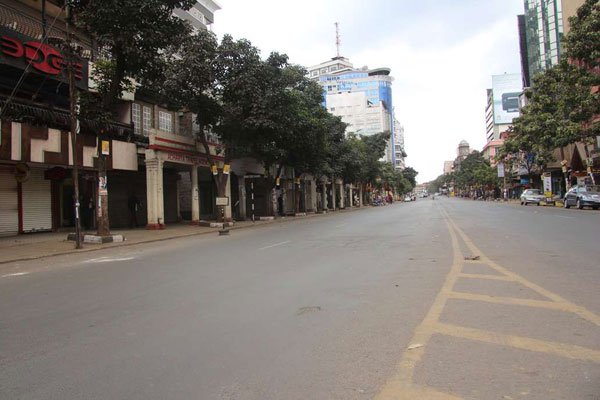On Wednesday, President Uhuru Kenyatta announced a nationwide curfew from 7 pm to 5 am effective from Friday 27th March.
The announcement came amid rumours that the government was to announce a total lockdown. As much as a majority of Kenyans believed that there might be a lockdown, the biggest fear has been whether or not a lockdown is possible in Kenya.
Well, announcing a lockdown is possible but keeping Kenyans in their houses is a whole different uphill task. It is already evident as most people are still travelling around the country even after the government advised Kenyans to stay indoors.
In one of his popular speeches, former president the late Mzee Daniel Moi described an African man as difficult to deal with.
”Mwafrika ni mgumu, kichwa ngumu,” (An African is hard-headed) noted the former head of state.
In the event Covid-19 forces the government to announce a total lockdown in the country, the first test would be keeping Kenyans in their homes. Kenya’s police and armed forces might help with that if they maintain their daily patrols on the streets.
South Africa announced a total lockdown for 21 days. It is near impossible for the same to happen in Kenya so in Kenya’s case the government can try to announce a 14-day lockdown. A lockdown in Kenya is not yet out of the equation with Covid 19 cases in the country continue to increase steadily.
The biggest issue about having a total lockdown in the country is that a majority of Kenyans live in a hand to mouth basis. These are the people who have to leave the house before they can put food on the table.
The transport sector, for instance, provides employment to almost a million Kenyans. This is a sector that will be completely dormant during the lockdown if Kenya is forced to go into one.
If the government announces a lockdown, Kenyans will, of course, be given time to stock up on the necessities they need for a lockdown. Some Kenyans will have enough money to buy all they need to survive the two or three weeks but the majority will not be able to afford that.
This is the government’s biggest fear. What will happen if these Kenyans run out of stock in the middle of the lockdown? The government should be in a position to help out those who are not capable of stocking up for the lockdown.
To the Kenyans who would have run out of stock, it will be like playing a simple ‘would you rather’ game. They will be contemplating whether to die of starvation or risk being infected with Covid-19 but at least get some food.
However, the outside environment will not be the same for casual workers and hand to mouth hustlers who need other people to promote their hustles. In a worst-case scenario, the crime rate in the country might increase as it might be the only options Kenyans are left with to make ends meet.
With Covid-19 cases steadily increasing in Kenya, the country might be forced to go into lockdown to curb the spread of the virus. If it comes to that, the government will have to think about those who cannot afford to stock up in order to have a smooth, effective lockdown.











![Kenya Kwanza Deputy Presidential candidate Rigathi Gachagua, William Ruto's running mate in the August polls, arriving for the Deputy Presidential debate on Tuesday, July 19, 2022/. [Photo/ CFM]](https://businesstoday.co.ke/wp-content/uploads/2022/07/RIGATHI-CUEA-ARRIVAL.jpg)
![Prof. Mutahi Ngunyi has been a fierce critic of DP William Ruto's 2022 Presidential bid, which President Uhuru Kenyatta is also campaigning against. [Photo/ YouTube]](https://businesstoday.co.ke/wp-content/uploads/2022/07/images-2022-07-13T192658.288.jpeg)
Leave a comment